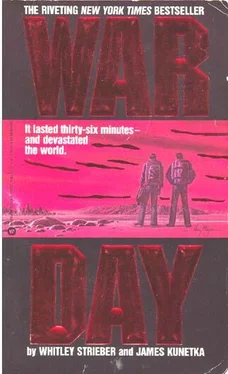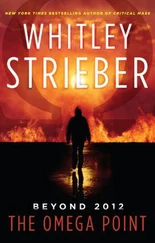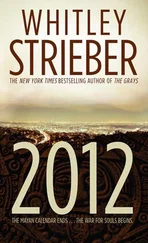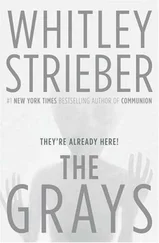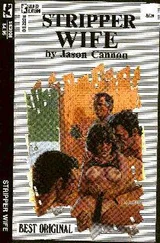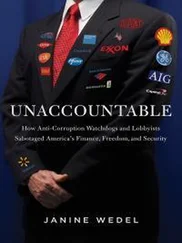There is an olive drab Chevy Consensus parked in front of the New York Coliseum. But for the lack of glass in the entrance and the grass spurting up through the sidewalk, the structure looks almost unchanged. The marquee reads, 56 THNY AUTOC 18-3. I remember the New York Auto Show.
A young woman gets out of the Consensus. We climb down from our perch in the truck. Across the street, the vast glut of Central Park roars with birds, a furious jungle just touched by autumn. The sidewalks around it are completely gone to vegetation, as are the abandoned cars choking Fifty-ninth Street. There are vines well up some of the elegant buildings that line Central Park South.
“I’m Jenny Bell,” the woman says, shielding her eyes from the bright morning sun. She wears a heavy tunic closed by a web belt.
There is what looks like a long-barreled .357 Magnum slung on her right hip. Her left hip bears a big, curved knife. She is wearing leather trousers and heavy boots. She carries a canteen, a backpack, a heavy-duty flashlight, and at least twenty feet of rope and a selection of climbing equipment. She does not smile, she offers no more words of explanation. She is simply there.
We introduce ourselves and get a quick handshake. “Let’s go,” she says. We leave our soldiers, who have instructions to pick us up here at 5:00 P.M. The Consensus is cramped. I sit in front because I can’t manipulate my pad and pencil in the back seat. Jim, with that fancy recorder of his, has to endure the confinement of the hard bench in the back.
“I understand that you’re a city employee,” I say to the young, expressionless face. The beautiful face. How old was this girl on Warday? Eighteen is my guess.
“That’s right.”
“So there’s still a city government?”
“That’s right.”
Jim shifts in his seat. “Is there any particular reason you won’t talk, or are you just being a hardass?”
The girl drives in silence, bouncing us down Broadway. A spring has opened up in the middle of the street between Fifty-seventh and Fifty-sixth. We are forced nearly to the sidewalk to avoid the bed of the little creek it has made. I see crystal water dancing among the skeletons of electrical conduit and pipe. It is young water, wearing and active. The stream goes on for blocks, finally disappearing into the gutters at the corner of Forty-fifth. I remember from some book about New York in the early days that an oak tree grew where Broadway now intersects Forty-second Street. A snatch of song echoes in my head—“those dancin’ feet…” The melody continues until we reach our first stop.
When I start to get out, the girl reaches over and locks my door. “Wait,” she says. She steps into the middle of Times Square.
Her gun is out. She holds it in both hands. It is a heavy weapon, too heavy for her to aim accurately any other way.
There is a loud click, then the pistol cracks. The report echoes off empty buildings. Pigeons rise from eaves, and a flock of guinea fowl burst out of the ruined front of Tape City, leaving feathers around a crackling poster of Paul Newman in the ’86 picture Jury of One.
Through the hubbub of the birds I can hear a dog screaming in agony, and more dogs barking. Many more dogs.
“Okay, come on out and take a look. You know Times Square?”
“I lived in this city for eighteen years,” I say.
“So I don’t have to talk.”
The dogs are in front of Bond’s Disco. They are dark, scruffy things. Two of them are worrying something long and angled like an arm. Our guide keeps her pistol in her hand.
“Many dog packs?”
“Yeah.”
“You love this city, don’t you?”
“I was born a few hundred yards from here, at St. Clare’s. It’s stripped. They stripped the hospitals first. I went to Dalton and then to Stuyvesant. I was in my senior year when it hit.”
“And you stayed on?”
“Most of my class did. We formed a volunteer action group. I’ve been working ever since. I haven’t had a vacation in five years.”
“What’s your group called?”
“At first we were Volunteers to Save the City. Now we’re part of the city government. Officially we’re called the Office of Salvage Management. I’m area manager for Chambers Street to the Battery. My job is to make sure that all salvage in my area is carried out by licensed salvors, and that the withdrawals are duly recorded and entered into the city’s record books.”
A glance at her hands tells me that she doesn’t wear a wedding ring. “Are you married—if you don’t mind me getting personal.”
“I haven’t got time.” She gets back into the car. “Come on. Next stop Sixth Avenue.”
“You don’t call it Avenue of the Americas,” Jim says.
“What’s the point?”
We move slowly down Forty-second. A narrow passage has been cleared between reefs of abandoned cars. Once again she takes out her pistol as she stops the car. There are no dogs about this time, so we get out. Through the distant overgrowth of Bryant Park I can see an immense and familiar shape. My heart almost breaks. There are vines pouring out of the windows of the Main Branch of the New York Public Library. I have the horrible thought that they must be somehow rooting in the books. Rot and mildew and moisture are changing them to a fertile soil.
“Is there any salvage for the library?”
“One-of-a-kind books only.”
It is a kind of lobotomy, the loss of a place like that.
Jim asks another question. “Do you actually live in the city?”
For the first time, she smiles. “I have a house on Eleventh Street. It once belonged to Nikos Triantaffilydis, the Greek shipping magnate.” Her smile widens. “I commandeered it for special purposes. We have that authority.”
As she speaks I hear a faint but very familiar sound. “Surely that’s not the subway?”
“You better believe it.” She glances at her watch. “That’ll be the 9:00 A.M. Westsider. It runs on the old D line from 145th Street to Grand. A lot of salvors live up in Washington Heights and commute into the salvage areas.”
“I thought the subway was flooded on Warday.”
“Below Twenty-third. It drained away over the six months after Warday. There are two working lines, the Westsider and the Eastsider. Each runs a three-car train. There are three morning and three afternoon runs, and one at noon. At nine-thirty the Westsider will be back.”
Suddenly Jim curses and slaps furiously at his head. “A bird! It flew in my hair.”
“It’s probably hunting for nesting materials. They don’t see enough people to worry about hands. It thought you were a nice hairy dog.”
I smell a faint tang of diesel smoke rising from the subway grating. I want to ask Jenny Bell if we can ride on that subway, if we can go down to the Village, to my old neighborhood. My chest is tight. Until now I haven’t realized just how much it means to me.
Jenny has opened up a little, but her steel shell is just waiting to snap closed again. This matter will have to be approached very carefully. “You live on Eleventh Street. That means that the Village is—”
“It’s almost a countryside down there. Fires leveled most of the West Village, and now everything’s covered with green. I like it. I like the look of it. And I like the sound of the wind in the ruins.”
I think of 515 West Broadway, where Anne and I raised Andrew, and had some very happy years. I knew everybody in that building—there were only fourteen apartments—but I lost track of them all. We left every single thing we owned at 515.
This is an entire city of haunted houses, rows and rows and towers and towers, softly crumbling into obscurity.
“Can we go down to the Village on the subway?”
“We’d have to go over to Grand Central. The nine-thirty Westsider is an uptown train. The Eastsider’s downtown. They’re staggered like that.” She gets in the car and starts it. Soon we are once again moving along the cleared path in the center of Forty-second Street. The silence in the car is split by a loud crash and a lingering roar somewhere off to the left. “Masonry falling,” Jenny says.
Читать дальше
